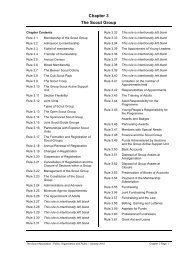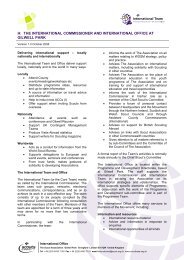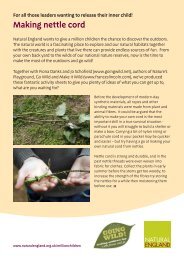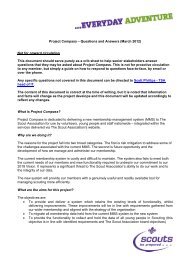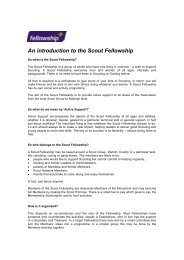So you want a new group meeting place? - The Scout Association
So you want a new group meeting place? - The Scout Association
So you want a new group meeting place? - The Scout Association
You also want an ePaper? Increase the reach of your titles
YUMPU automatically turns print PDFs into web optimized ePapers that Google loves.
<strong>So</strong> <strong>you</strong> <strong>want</strong> a <strong>new</strong><br />
<strong>group</strong> <strong>meeting</strong> <strong>place</strong><br />
A guide to guarantee a<br />
successful project<br />
Chapter<br />
1. Introduction<br />
2. Where do <strong>you</strong> start<br />
3. Why, where, what and when<br />
4. Group governance and potential legal problems<br />
5. <strong>So</strong> <strong>you</strong> have decided to proceed<br />
6. Project management<br />
7. <strong>The</strong> budget<br />
8. <strong>The</strong> build process<br />
9. Business plan<br />
10. Funding<br />
11. During the project<br />
12. Grand opening<br />
13. <strong>The</strong> future<br />
14. Further advice and sources of information<br />
15. Acknowledgements<br />
Note<br />
Although in some parts of the British Isles <strong>Scout</strong> Counties are known as Areas (Wales) or Islands, and<br />
in one case Bailiwick, for ease of reading this publication simply refers to County/Counties. In Scotland<br />
there is no direct equivalent to County or Area. In Scotland, <strong>Scout</strong>ing is organised into Districts and<br />
Regions, each with distinct responsibilities.<br />
© 2012 <strong>The</strong> <strong>Scout</strong> <strong>Association</strong> Registered Charity Numbers 306101 (England and Wales) and SC038437 (Scotland)
<strong>So</strong> You Want a New Group Meeting Place 2<br />
1. Introduction<br />
Following the launch of the Development Grants Board’s<br />
Building Fund pilot project in September 2008, it was clear that<br />
many Groups wished to build a <strong>new</strong> <strong>meeting</strong> <strong>place</strong> or carry out<br />
major refurbishments to their existing <strong>meeting</strong> <strong>place</strong>. While<br />
many enquiries to UK Headquarters started by seeking access<br />
to funding, it became evident that much more support was<br />
needed over a broader spectrum.<br />
This resource brings together much of the good practice and<br />
lessons learned from the Groups who were part of the pilot<br />
project. It includes general support, ideas and suggestions,<br />
however, much of the detailed advice, information and support<br />
<strong>you</strong> need will have to be sourced locally.<br />
Before <strong>you</strong> turn to the relevant chapter to address <strong>you</strong>r query,<br />
please take a moment to read this resource from the beginning.<br />
It might start an alternative line of thinking and suggest a<br />
different way for <strong>you</strong> to resolve the problem. Equally it may<br />
confirm that <strong>you</strong>r original decision was the correct one.<br />
Remember – the resource is built on the lessons learnt by others<br />
across a range of projects, supplemented by the expertise and advice<br />
of a range of professionals . We would like to thank everyone<br />
who contributed and also wish <strong>you</strong> well with <strong>you</strong>r project.<br />
2. Where do <strong>you</strong> start<br />
<strong>The</strong>re may have been considerable discussion about building a<br />
<strong>new</strong> headquarters for <strong>you</strong>r Group. But before crystallising <strong>you</strong>r<br />
thoughts, it would be helpful to undertake a self-examination<br />
of <strong>you</strong>r Group. Just how strong is the Group in leadership,<br />
parental, Group Executive Committee and other support and<br />
what do <strong>you</strong> think <strong>you</strong> can realistically achieve<br />
<strong>So</strong>me Groups may find it difficult to raise £100,000, whereas<br />
others may see no problem in raising £500,000. Be realistic.<br />
Also, Section Leaders cannot run their Sections and also ensure<br />
the completion of a building programme, so parental and<br />
community support is essential. If <strong>you</strong>r Group does not benefit<br />
from this support at the moment we suggest strongly that <strong>you</strong><br />
take time to build up <strong>you</strong>r supporters before starting on any<br />
major project.<br />
To help gain a real picture of <strong>you</strong>r Group at this moment,<br />
a SWOT analysis may be helpful to detail the strengths,<br />
weaknesses, opportunities and threats. Such an analysis goes<br />
hand in hand with a Group Development Plan or a RAG (Red/<br />
Amber/Green) assessment – <strong>you</strong>r District and County team will<br />
be able to help <strong>you</strong> with these.<br />
In undertaking such a review, it may become apparent that<br />
certain facilities are more important than others. You may also<br />
find that, if <strong>you</strong> adopt a different approach, there may be an<br />
opportunity to develop a project in conjunction with another<br />
<strong>Scout</strong> Group, the local Guides, a church, local school, education<br />
authority, or other organisation.<br />
You should also consider how <strong>you</strong>r project relates to <strong>you</strong>r<br />
District’s development plan, as well as plans <strong>you</strong>r County/Area<br />
or Region (Scotland) might have for the wider metropolitan<br />
area, and possibly the adjoining County. Is the Group in the<br />
right location, within a strong enough community, and will the<br />
cost and effort justify the project<br />
3. Why, where, what and when<br />
Following the SWOT analysis, gather more information by asking<br />
<strong>you</strong>r Group some basic questions.<br />
Why do <strong>you</strong> think <strong>you</strong> need a <strong>new</strong> building or need to refurbish<br />
the existing headquarters Is the Group growing – if so will the<br />
growth be maintained or become even greater if <strong>you</strong> build<br />
Or is the current building so dilapidated that it is a danger to<br />
anyone entering the structure – if so, is there an interim plan to<br />
keep the Group running while immediate repairs are carried out<br />
It is a sad fact that many Groups try to continue to use their<br />
premises even though they know it is unsafe. This is done in<br />
the belief that if the building closes, the Group will fold. <strong>The</strong>re<br />
needs to be an appreciation of the risk that leaders/ <strong>The</strong> Group<br />
Executive Comittee are exposing members to, but there are<br />
usually ways to find alternative temporary accommodation. If<br />
<strong>you</strong> think it is so unsafe that inspectors would close the building,<br />
then in all likelihood <strong>you</strong> are right and <strong>you</strong> should move<br />
elsewhere. It is not worth waiting for an accident to happen.<br />
Is there an alternative to <strong>you</strong>r need ‘We have had our own<br />
<strong>meeting</strong> <strong>place</strong> for over 70 years now. It used to be a builders’<br />
yard until they moved. We just can’t do without our own <strong>place</strong>.’<br />
This is a common story heard throughout the country, yet the<br />
fact that <strong>you</strong> have always had <strong>you</strong>r own <strong>meeting</strong> <strong>place</strong> does not<br />
necessarily mean it is the best resource to have for the future.<br />
And there may be alternatives.<br />
Consider these options:<br />
• What other community facilities are there within <strong>you</strong>r<br />
surrounding area<br />
• Are they fully used or do they have space/times available<br />
which <strong>you</strong> might be able to use<br />
• Have other community facilities in <strong>you</strong>r area, including other<br />
<strong>Scout</strong> premises, had grants to rebuild or refurbish in the last<br />
three years<br />
• Can different Sections meet in different <strong>place</strong>s<br />
• What would the differences in cost be if <strong>you</strong> had to rent/<br />
lease other premises<br />
• Could <strong>you</strong> use a commercial storage facility for <strong>you</strong>r<br />
equipment rather than <strong>you</strong>r own <strong>meeting</strong> <strong>place</strong><br />
• What could <strong>you</strong> do by selling off <strong>you</strong>r land/building to a<br />
developer – what options would that open up to <strong>you</strong><br />
• Given the work that is going to be required to raise the<br />
substantial funding, find a <strong>new</strong> <strong>meeting</strong> <strong>place</strong> and enlist<br />
people to help, is the inconvenience worth it
<strong>So</strong> You Want a New Group Meeting Place 3<br />
Make sure <strong>you</strong> have really thought about all the other options<br />
before <strong>you</strong> begin a search for <strong>you</strong>r own <strong>meeting</strong> <strong>place</strong>.<br />
Where do <strong>you</strong> propose to build the <strong>new</strong> headquarters Does<br />
the <strong>group</strong> own the site and, therefore, are <strong>you</strong> proposing a<br />
straight re<strong>place</strong>ment by way of enhanced accommodation Or<br />
is there some radical thinking that two nearby Groups should<br />
join forces or even relocate into a <strong>new</strong> housing development<br />
to provide a <strong>you</strong>th facility and immediate growth. In this case,<br />
there may be an opportunity to get the developer to assist with<br />
land provision plus construction costs – this might be required<br />
by the local planning authority as a condition of planning<br />
consent. Is the existing site so large that part could be sold for<br />
redevelopment, with a <strong>new</strong> headquarters provided as part of<br />
the <strong>new</strong> development<br />
What do <strong>you</strong> really need and what can <strong>you</strong> afford Is there<br />
really a need to rebuild when a major refurbishment is a more<br />
affordable proposition By remodelling or extending the existing<br />
building, would <strong>you</strong> achieve what is required for the foreseeable<br />
future <strong>The</strong>re is no sense in trying to build a sports centre when<br />
a <strong>Scout</strong> <strong>meeting</strong> <strong>place</strong> is what is required. A hall the size of a<br />
badminton court may address <strong>you</strong>r needs, rather than an indoor<br />
football pitch. Think hard about how <strong>you</strong> use the building<br />
currently, but also think about the future use and how space<br />
could be better used.<br />
What do <strong>you</strong> need as a basic headquarters building A typical<br />
brief would include a <strong>meeting</strong> hall, toilets for male/female and<br />
disabled users, kitchen suitably equipped, <strong>meeting</strong> rooms and<br />
storage for equipment. <strong>The</strong> building needs permanent suitable<br />
access, parking facilities, availability of main services and<br />
appropriate heating. What else do <strong>you</strong> need, and for whom in<br />
the future<br />
When is all this going to happen A lot will depend on <strong>you</strong>r<br />
detailed planning, costing and availability of funding. However,<br />
is it possible to achieve <strong>you</strong>r goal by increments Would a<br />
phased development be more achievable, maintain everyone’s<br />
interest and not overextend the fundraising team<br />
This is not a matter of dampening enthusiasm but to be realistic<br />
about what can be achieved. With some lateral thinking,<br />
opportunities which were not obvious at the beginning may<br />
become self-evident and give an added impetus to the<br />
whole project.<br />
4. Group governance and<br />
potential legal problems<br />
<strong>The</strong>re are some legalities to bear in mind. Please note,<br />
the following is very general and not intended as a<br />
comprehensive list of important matters. Groups<br />
should obtain more specific, local legal advice<br />
before proceeding.<br />
Obtaining adequate legal advice<br />
In land matters, it is very important that the Executive<br />
Committee – as the Charity Trustees responsible for the Group’s<br />
affairs – ensure that they are acting legally and with due care.<br />
Thus, if actually selling/buying land they must instruct a<br />
qualified solicitor/conveyancer to undertake the sale or purchase<br />
on their behalf. When entering leases, they must ensure<br />
that, if in any doubt, they should instruct a qualified solicitor/<br />
conveyancer to undertake the matter for them. In building or<br />
renovation projects, they should ensure that they appoint a<br />
suitably qualified or able project manager to oversee and coordinate<br />
the project.<br />
Scotland: Charity law is different in Scotland from other parts<br />
of the UK. In Scotland Executive Committee members are<br />
notCharity Trustees unless the body concerned is registered in<br />
its own right with the Office of the Scottish Charity Regulator<br />
(OSCR). It is strongly advised that <strong>Scout</strong> bodies in Scotland<br />
embarking on a substantial building and related fundraising<br />
project should register as a charity with OSCR and obtain their<br />
own charity number. If they do not do so, they cannot refer to<br />
themselves as a charity and thus may find they are ineligible for<br />
funding from many grant bodies and trusts; they will not be able<br />
to claim Gift Aid on donations; they may also be ineligible for<br />
rates relief for their property from their local authority.<br />
Laws relating to property are also different in Scotland and so<br />
are related parts of POR. In Scotland, for Groups and Districts,<br />
the responsible Trustees holding title for heritable property<br />
or leases are the Regional Chairman, Secretary, Treasurer and<br />
Commissioner. <strong>The</strong> Regional Executive needs to be consulted<br />
and informed.<br />
<strong>The</strong> <strong>Scout</strong> <strong>Association</strong>’s Legal Department can provide some<br />
initial and general advice in land matters but, due to the<br />
logistics involved, is unable to give detailed advice, enter into<br />
any negotiation with other parties on behalf of Groups, or<br />
represent Groups as their solicitor/conveyancer - hence the need<br />
for local advice.<br />
Decision-making and Group governance:<br />
have <strong>you</strong> got Executive Committee approval<br />
All substantial decisions should be evidenced by Executive<br />
Committee approval and this is especially true of decisions<br />
regarding land. This could be by the passing of a resolution or<br />
ensuring that all decisions are properly recorded in the minutes<br />
of the Executive Committee <strong>meeting</strong>. This is because, as the<br />
Charity Trustees of the Group, the Executive Committee are<br />
responsible for all decisions regarding running the Group and<br />
its land. If a building project is delegated to certain Executive or<br />
other members, the delegation itself should be recorded and<br />
matters monitored properly by the Executive thereafter. Thus,<br />
in addition to making any initial decision to proceed with a<br />
building project, the Executive should ensure that it records all<br />
progress on a regular basis.<br />
Type of proprietary interest in existing<br />
headquarters and land<br />
In order to expend monies on land – whether improving the<br />
current building or erecting a <strong>new</strong> one – the Executive Committee<br />
of the Group must ensure that the existing or intended legal<br />
interest in the land is sufficient to justify the intended<br />
expenditure. Of course the best interest to hold is freehold,<br />
however, many Groups hold a leasehold interest or a mere<br />
licence and in such cases will almost need to obtain the landlord’s
<strong>So</strong> You Want a New Group Meeting Place 4<br />
consent when improving any existing buildings on the land.<br />
With leasehold interests, the question for the Executive will<br />
be whether the term of the leasehold interest is sufficient.<br />
This is because, at the end of the lease, the land and any fixed<br />
building will usually revert back to the landlord, despite the<br />
Group having built or improved the building. <strong>So</strong>metimes, before<br />
signing leases, Groups negotiate with the landlord that a clause<br />
be added stating that if the lease is terminated (for any reason)<br />
the landlord will pay the Group the value of the building at the<br />
time of termination. However, although always worth a try, such<br />
clauses are rarely agreed by landlords!<br />
Assessing whether there is sufficient leasehold interest in the<br />
land to justify the expenditure can sometimes be tricky for an<br />
Executive Committee. However, the general rule of thumb is<br />
to weigh the amount of expenditure against the length of use<br />
the Group will gain. <strong>So</strong>, for example, spending £50,000 on a<br />
building will hardly be justified if the <strong>group</strong> only has three years<br />
left on its lease. Another guide, especially in ‘<strong>new</strong>’ builds is<br />
to ensure that the Group has enough time left on the land to<br />
enjoy the majority of the estimated ‘life’ of the building itself.<br />
Furthermore, it is always important to remember that the main<br />
funders expect at least a minimum of a 25-year lease before<br />
they make grants available.<br />
Where the Group has any interest in land or building less than<br />
a freehold or a leasehold interest – for example, a licence or<br />
a tenancy agreement of other sort – then they should not<br />
undertake any substantial expenditure as such agreements can<br />
usually be terminated by the landlord at short notice.<br />
Subletting leasehold premises<br />
If the plan is to build <strong>new</strong> or improve existing premises with<br />
a view to then sublet to generate additional income for the<br />
Group, then it is very important to ensure that the Group’s<br />
interest in the land actually allows this. <strong>So</strong>, it is important to<br />
check with freehold land that there is no restriction about what<br />
the land can used for, and in leasehold land, whether the lease<br />
allows subletting. You may wish to think about allowing a<br />
pre-school to have occupation, during part of the day under<br />
licence. A licence document specifically states no leasehold<br />
interest is created.<br />
Verbal agreements<br />
Proprietary interests in land cannot be evidenced by verbal<br />
agreements: they must be in writing. <strong>So</strong>, if a Group has been<br />
occupying land historically under a verbal agreement, this should<br />
be formalised, especially where there are plans to build or<br />
improve the building or land.<br />
Appointing Trustees to hold title to land<br />
Unless a <strong>Scout</strong> Group, in the very rare circumstance, is registered<br />
as a company in its own right, title to its freehold or leasehold<br />
land cannot be held in the name of the <strong>Scout</strong> Group itself: it<br />
must either be held in the name of individual Trustees appointed<br />
locally or a Trust Corporation. <strong>The</strong> <strong>Scout</strong> <strong>Association</strong> Trust<br />
Corporation (SATC) is one such corporation and was formed<br />
in 1935 to ease the administrative burden on Groups having<br />
to enlist local Trustees and can hold title as Custodian Trustee<br />
on behalf of <strong>Scout</strong> (or <strong>Scout</strong>/Guide) Groups of either freehold,<br />
leasehold land (and on occasion, of sufficiently long licences).<br />
As Custodian Trustee, the SATC has no responsibility for the<br />
day-to-day management of the Group’s land as this remains the<br />
responsibility of the Group Executive Committee.<br />
<strong>So</strong>, whether embarking on purchasing a <strong>new</strong> freehold, a <strong>new</strong><br />
leasehold or if considering transferring an existing freehold<br />
or leasehold interest, the Executive should consider whether<br />
the SATC may be of use. Please note, there is a standard fee<br />
applicable in appointing the SATC to hold title, and other<br />
stipulations also apply. More information can be provided by the<br />
SATC at trust.corporation@scouts.org.uk<br />
Please note that the SATC does not operate in Scotland. For<br />
Groups and Districts in Scotland, the responsible Trustees for all<br />
matters of heritable property or leases are the Region Chairman,<br />
Secretary, Treasurer and Commissioner. <strong>The</strong> Region Executive<br />
Committee needs to be consulted and informed (see page 3).<br />
5. <strong>So</strong> <strong>you</strong> have decided to proceed!<br />
You may have enjoyed watching Grand Designs on television,<br />
but now <strong>you</strong> have to decide what <strong>you</strong> <strong>want</strong> and, more importantly,<br />
what can <strong>you</strong> afford If <strong>you</strong> already have a headquarters <strong>you</strong><br />
may think <strong>you</strong> know what <strong>you</strong> <strong>want</strong> by way of improved<br />
accommodation; but be creative and visit as many other Groups<br />
as <strong>you</strong> can and ask how their building works for them.<br />
Do not forget that any <strong>new</strong> building will not only require<br />
planning permission but will also have to comply with the latest<br />
building regulations, access for the disabled, fire escapes and<br />
environmental considerations, so <strong>you</strong> may have to do more<br />
than just a straight re<strong>place</strong>ment. It is also good practice to<br />
consult <strong>you</strong>r members and current users of the building – that is,<br />
everyone. Ask the <strong>you</strong>ng people, leaders, parents, the Group’s<br />
supporters, others who may use the building from other local<br />
community <strong>group</strong>s. You may be surprised what <strong>you</strong> hear and<br />
gain ideas which a small committee may not have thought<br />
about. In funding terms, this is called ‘identifying the need’ and<br />
‘consulting the stakeholders’ – without this evidence, some<br />
funders will turn <strong>you</strong> down as <strong>you</strong> have not shown that this<br />
facility is actually needed or <strong>want</strong>ed by the local community.<br />
Prospective funders to <strong>you</strong>r cause will be interested in<br />
understanding <strong>you</strong>r need for a <strong>new</strong> <strong>meeting</strong> <strong>place</strong>. Speak<br />
to existing and potential users to help <strong>you</strong> identify this. Put<br />
together a short questionnaire or record <strong>meeting</strong>s <strong>you</strong> have<br />
with people. Funders will be more interested in a project that<br />
supports the aims and needs of more than one community<br />
<strong>group</strong>. Think about how <strong>you</strong>r <strong>meeting</strong> <strong>place</strong> could be used<br />
for more than just <strong>Scout</strong>ing. What would encourage other<br />
community <strong>group</strong>s to use <strong>you</strong>r building Gather all this evidence<br />
to show the need for doing the work.<br />
<strong>The</strong> refurbishment, or in some cases minor extensions (regarded<br />
as ‘’permitted development’) may require only building<br />
regulation approval. It depends on the extent of the works,<br />
but before contemplating such work, it is necessary to speak<br />
to the Local Planning Department who will advise as to their<br />
interpretation of the planning legislation.
<strong>So</strong> You Want a New Group Meeting Place 5<br />
It is useful to consider the extent of the scheme in financial<br />
terms; is it small (less than £10,000), medium (£20,000–<br />
£50,000) or large (in excess of £50,000) <strong>The</strong> cost will depend<br />
on <strong>you</strong>r preferred building option – for example, changing<br />
from brick to concrete or timber, a sectional building or a major<br />
refurbishment with <strong>new</strong> roof, double-glazed windows and<br />
asbestos removal. Whatever <strong>you</strong> decide, remember the premises<br />
are a public building and should be of the highest standard <strong>you</strong><br />
can afford. When considering any work to the mains services<br />
<strong>you</strong> must engage a contractor who is suitably qualified and<br />
registered, such as Gas Safe registered.<br />
First impressions count. Groups who have carried out such<br />
work have noted an immediate appreciation of the enhanced<br />
facilities by parents, who previously may not have been keen on<br />
their children joining the Group, or who have not had previous<br />
experience of <strong>Scout</strong>ing. A smart modern building gives an<br />
excellent first impression to all visitors, encourages community<br />
use, bringing in valuable income and helps to encourage other<br />
people to join <strong>Scout</strong>ing.<br />
When considering potential users of the building, have <strong>you</strong><br />
thought of any external lessees who might need their own room<br />
in addition to the hall For a modest increase in cost, they might<br />
provide a steady income to help meet the future maintenance.<br />
You will need to think ahead as much as possible. It is now that<br />
<strong>you</strong>r preparation on the Group Development Plan will come into<br />
its own.<br />
At this stage <strong>you</strong> will be preparing a brief to give to a project<br />
manager, who could be a building surveyor, quantity surveyor or<br />
architect. It is important to have a professional to help <strong>you</strong> – see<br />
below. Your project manager will be able to draw <strong>you</strong>r ideas<br />
together and create a feasibility study which will give <strong>you</strong> an<br />
idea of the likely costs before <strong>you</strong> incur the expense of detailed<br />
drawings, specifications, contracts, and so on.<br />
A question often asked is, ’Can <strong>you</strong> give us an outline of a<br />
typical <strong>Scout</strong> headquarters’ <strong>The</strong> simple answer is that there<br />
seems to be no such thing as typical. Think about <strong>you</strong>r own<br />
needs and those of <strong>you</strong>r community.<br />
• How many people could the Group membership grow to if<br />
the building was in better condition<br />
• Are there opportunities to open more Sections within<br />
the Group<br />
• How many more <strong>you</strong>ng people would benefit if the building<br />
was better<br />
• Can <strong>you</strong> make the building bigger<br />
• Can <strong>you</strong> sell some of the land to a developer to help with<br />
the costs of refurbishment or rebuilding<br />
• Can <strong>you</strong> do the project in phases<br />
• Can <strong>you</strong> move the Sections/Group to other community<br />
premises, for example, schools, community/village halls,<br />
other sports clubs, Masonic halls, church premises<br />
• Where else can <strong>you</strong> store equipment other than in leaders’<br />
garages and the <strong>Scout</strong> hall<br />
• If the building was in better condition, what organisations<br />
in the local community would be interested in being users<br />
Think widely for daytime use, half day/full day; weekend<br />
use; weekly/fortnightly/monthly/quarterly use If <strong>you</strong> close<br />
in the school holidays, who could use the building then<br />
Think about when <strong>you</strong> don’t use the building at all, and<br />
think who could use it. Talk to these <strong>group</strong>s and ask them<br />
what they would <strong>want</strong> in a building.<br />
• How long do <strong>you</strong> expect the <strong>new</strong> building to last before<br />
doing this again<br />
• Consider the cost per head of refurbishing/building a <strong>new</strong><br />
<strong>meeting</strong> <strong>place</strong> – is the cost worth it<br />
• How will <strong>you</strong> maintain membership during the building<br />
project and how will <strong>you</strong> plan for membership to grow<br />
• Who will lead the project Who will lead <strong>you</strong>r fundraising<br />
Who will lead <strong>you</strong>r Sections <strong>The</strong>se should all be<br />
different people.<br />
This is just a sample of the type of questions <strong>you</strong> will need to<br />
ask <strong>you</strong>rself. Don’t just assume <strong>you</strong> will need or be able to have<br />
what <strong>you</strong> have always had – look to the future and don’t be<br />
afraid to say ’no’.<br />
From the Groups involved in the pilot project, here is a sample<br />
list of simple questions <strong>you</strong> can ask <strong>you</strong>rself and others:<br />
• What do <strong>you</strong> like about <strong>you</strong>r current <strong>meeting</strong> <strong>place</strong><br />
• What do <strong>you</strong> not like about it<br />
• If <strong>you</strong> were to change it for <strong>you</strong>r current use today, what<br />
changes would <strong>you</strong> make, if any<br />
• How would <strong>you</strong> like to use <strong>you</strong>r building in the future<br />
• Do <strong>you</strong> need to have space to use outside the building If<br />
yes, what for and what would that entail<br />
• Do <strong>you</strong> currently use the space <strong>you</strong> have well or is it full of<br />
things which are not used much<br />
• If money was not a problem, what changes would <strong>you</strong> like<br />
to make Prioritise this list – what is MOST important to the<br />
majority of people and what is LEAST important<br />
• What do <strong>you</strong> need to do to make the building a minimum<br />
of safe, warm and dry and with enough storage for <strong>you</strong><br />
to use
<strong>So</strong> You Want a New Group Meeting Place 6<br />
6. Project management<br />
One of the main lessons from the Development Grants Board’s<br />
Building Fund pilot project was the need for Groups to bring<br />
in professional assistance as early as possible and to appoint<br />
a knowledgeable and able project manager. It is neither<br />
appropriate nor feasible for a Section Leader to continue to run<br />
a Section and also be responsible for a major building project<br />
on behalf of the Group. <strong>So</strong>me Groups may have access to an<br />
appropriately qualified professional to undertake legal, design<br />
or planning work on a pro bono basis, but the requirement<br />
to monitor a major building project does mean <strong>you</strong> will need<br />
someone with the necessary skills and time, and this will mean<br />
paying fees.<br />
Before <strong>you</strong> employ an adviser, <strong>you</strong> should check that they have<br />
the necessary knowledge and expertise, as well as appropriate<br />
indemnity insurance. Take great care and, if necessary, seek<br />
further advice before entering into a contract.<br />
<strong>The</strong> principal professional bodies whose members would be able<br />
to provide appropriate help are:<br />
<strong>The</strong> Royal Institution of Chartered Surveyors<br />
Parliament Square<br />
London SW1P 3AD<br />
Tel: 0870 333 1600<br />
Email: contactrics@rics.org<br />
Website: www.rics.org<br />
<strong>The</strong> Royal Institute of British Architects<br />
66 Portland Place<br />
London, W1B 1AD<br />
Tel: 0207 580 5533<br />
Email: info@inst.riba.org<br />
Website: www.architecture.com<br />
<strong>The</strong> Royal Town Planning Institute<br />
41 Botolph Lane<br />
London EC3R 8DL<br />
Tel: 02079299494<br />
Website: www.rtpi.org.uk<br />
For free legal advice and information, there are a number of<br />
charitable bodies <strong>you</strong> may get help from:<br />
<strong>The</strong> National Pro Bono Centre: <strong>The</strong> National Pro Bono Centre<br />
houses the profession’s national clearing houses for legal pro<br />
bono work delivered in England and Wales: the Bar Pro Bono<br />
Unit, LawWorks (the <strong>So</strong>licitors’ Pro Bono Group) and ILEX Pro<br />
Bono Forum. <strong>The</strong> centre is designed to be a hub for pro bono<br />
charities in the sector and will support the wide range of pro<br />
bono projects and brokerage which the charities support,<br />
helping individuals and community <strong>group</strong>s all over England<br />
and Wales.<br />
None of these professional bodies are permitted to recommend<br />
one person or one professional practice over another but they<br />
can advise about the firms in <strong>you</strong>r area. It is possible to view<br />
their geographical membership list online.<br />
<strong>The</strong> Royal Institution of Chartered Surveyors have a number of<br />
faculties within their membership, including building surveyors<br />
who would help design and monitor construction plus advise<br />
how best to refurbish an existing building, and quantity<br />
surveyors who can advise on cost and construction of buildings.<br />
Members of the above professional bodies are obliged to carry<br />
profession indemnity insurance.<br />
<strong>The</strong> reason for this strong recommendation to seek the advice of<br />
professional bodies is that those qualified will be up-to-date with<br />
current legislation and the requirements of the local planning<br />
authority in respect of planning permission, building regulation<br />
approval, environmental assessments, (including the removal of<br />
asbestos or similar material), archaeological survey, sustainable<br />
development by way of cost and long-term maintenance. You<br />
should also be aware of local proposals such as roads, railways,<br />
availability of main services, secure access to the building for<br />
all purposes and last, but no means least, the reaction of the<br />
immediate neighbours to the existing or potential development.<br />
Under the Construction, Design and Management (CDM)<br />
regulations <strong>you</strong> will need to appoint a CDM planning coordinator<br />
– <strong>you</strong>r project manager will advise on the detail. <strong>The</strong><br />
CDM planning co-ordinator is required to ensure all health and<br />
safety regulations are met during the construction period and<br />
subsequent use of the premises. This includes addressing the<br />
health and safety issues of the contractor plus any analysis of the<br />
construction and future maintenance. <strong>The</strong>re should be detailed<br />
documentation available to the client at the end of the project.<br />
<strong>The</strong> Group must ensure that the appropriate employer’s liability<br />
and public liability insurance is in <strong>place</strong> before starting any such<br />
development.<br />
You will need to check whether <strong>you</strong> or the builders are<br />
responsible for insurance covering the site and building<br />
construction. Try to avoid contracts where the builder makes <strong>you</strong><br />
responsible for insurance. If this is not possible, please contact<br />
Unity Insurance, as additional insurance will be needed. Not only<br />
will <strong>you</strong> need adequate liability insurance but also insurance<br />
for materials on site, hired plant and equipment, and for the<br />
building as it goes up.<br />
Depending on the nature of <strong>you</strong>r project, <strong>you</strong> may also need<br />
some more complex insurance. Contact <strong>you</strong>r insurance adviser<br />
or Unity Insurance (www.scoutinsurance.co.uk) to discuss<br />
<strong>you</strong>r needs.<br />
Web site: www.nationalprobonocentre.org.uk
<strong>So</strong> You Want a New Group Meeting Place 7<br />
7. <strong>The</strong> budget<br />
Your project manager should help <strong>you</strong> to plan budgets.<strong>The</strong>re<br />
are two budget areas that must be considered when embarking<br />
on a building project: the capital costs of actually building <strong>you</strong>r<br />
project; and the expenditure <strong>you</strong> will need to run the project, for<br />
example, costs of fundraising.<br />
To start with, <strong>you</strong> should plan for the best. Don’t think about<br />
the money at the initial stage; think about what <strong>you</strong> would like<br />
to do if money was no object. It is much easier to look at it in<br />
this way and then scale back than to produce what <strong>you</strong> think<br />
<strong>you</strong> can afford and then find out that <strong>you</strong>r calculations are<br />
wrong and there are extras that need to be covered. Include<br />
absolutely everything <strong>you</strong> can think of with regard to the<br />
building (including professional fees for architects, planning<br />
permission, project management costs as well as ground<br />
works and building materials, and so on). Also go for a slightly<br />
higher specification than the basic. This will help to cover the<br />
inflationary cost between fundraising and writing applications<br />
for funding and the actual building starting. You may later<br />
decide that <strong>you</strong>r original proposal is too big, and <strong>want</strong> to scale<br />
back the project or work in phases.<br />
Depending on the size and scale of <strong>you</strong>r project, <strong>you</strong> may need<br />
to cost out the following activities or expenditure. Please note:<br />
this list tries to provide a comprehensive list of the costs <strong>you</strong><br />
may need to include. <strong>So</strong>me (such as staff) may not be relevant<br />
to <strong>you</strong>r project.
<strong>So</strong> You Want a New Group Meeting Place 8<br />
<strong>The</strong> project budget<br />
This budget may include items such as:<br />
Construction costs (sometimes called hard costs, soft costs being expenses<br />
such as fees and permits).<br />
£<br />
Architectural fees (usually a percentage of the project). £<br />
Architectural renderings. <strong>The</strong> two-dimensional images of what the<br />
building will look like. (<strong>The</strong> renderings need to be completed before the<br />
campaign is launched because they play an important role in building the<br />
case for support. <strong>The</strong> costs affiliated with the renderings will need to be<br />
funded upfront.)<br />
£<br />
Engineering and contractor fees. £<br />
Fees and permits required by local municipalities. £<br />
Environmental impact statements including historical impact studies if the<br />
building involves a historical structure.<br />
£<br />
Possible environmental clean-up if issues are found such as asbestos<br />
removal, soil remediation, and so on.<br />
£<br />
Furniture, fixtures and equipment. £<br />
Communication systems (such as telephone and internet). £<br />
Computer systems, including wiring. £<br />
Rental for <strong>meeting</strong> space during construction phase (if needed). £<br />
Interest on loans for construction or bridging loan while pledges are<br />
being paid.<br />
£<br />
Inflation (the longer the project is delayed, the higher expenses will be). £<br />
Contingency for unexpected expenses. £<br />
VAT may be payable on the expenditure, but in many cases the building<br />
costs can be zero-rated for VAT. Guidance is available on the Accounts and<br />
Insurance section of www.scouts.org.uk. However, the VAT legislation on<br />
this is complex and <strong>you</strong> are advised to contact the Finance team at Gilwell,<br />
either via the Information Centre or by email to finance@scouts.org.uk<br />
£<br />
Total £
<strong>So</strong> You Want a New Group Meeting Place 9<br />
Fundraising budget<br />
Fundraising expenses can be a separate budget and are often<br />
funded through the campaign itself. In most cases, these<br />
expenses will be included in the overall goal for the fundraising<br />
campaign, but <strong>you</strong>r Executive Committee may decide to include<br />
these separately. Fundraising costs are dependent on many<br />
factors, such as the size, the duration, the geographic scope of<br />
the fundraising campaign, the amount of time required from<br />
a paid fundraiser if <strong>you</strong> decide to employ one, and the existing<br />
fundraising structure in <strong>place</strong>.<br />
As a general rule, these costs will run somewhere between 5%<br />
and 15% of the total campaign goal. Generally the larger the<br />
fundraising campaign, the lower this percentage will be.<br />
<strong>The</strong> following items are costs which <strong>you</strong> may need to include in<br />
<strong>you</strong>r overall budget:<br />
• Professional services – This may include a professional<br />
fundraiser, plus their expenses. Ensure <strong>you</strong> are clear what<br />
their expenses cover.<br />
• Promotional leaflets, costs of writing and printing <strong>you</strong>r<br />
business plans.<br />
• Funder recognition – Plan in advance how <strong>you</strong> will provide<br />
recognition to funders, so <strong>you</strong> can advise them about the<br />
type of promotion they will receive, such as wall plaques.<br />
• Fundraising events – This may include finding funders,<br />
the kickoff event, <strong>meeting</strong>s, topping out and opening<br />
events. Think also about what return <strong>you</strong> expect for <strong>you</strong>r<br />
fundraising activities. For every £1 <strong>you</strong> spend on fundraising,<br />
<strong>you</strong> should be aiming to receive approximately £4. It is what<br />
is known as the ROI – the return on investment.<br />
• Support systems – Item expenses in this category will<br />
include telephone, fax, and internet costs directly related<br />
to the fundraising campaign. Include line items for postage<br />
and office supplies in this category as well.<br />
• Travel – Travel expenses may be a factor if trips to national<br />
or regional foundations to discuss applications are required.<br />
Don’t underestimate this category, as it is often more costly<br />
than most fundraising campaigns budget for.<br />
8. <strong>The</strong> building process<br />
Your project manager should be able to help <strong>you</strong> to find<br />
and select the right tradesmen and builders. <strong>The</strong> extent of<br />
professional and third-party support <strong>you</strong> need will depend on<br />
the amount of work <strong>you</strong> propose to undertake.<br />
While this is a generic guide, we suggest <strong>you</strong> consider each area<br />
or room one at a time, for example:<br />
Ceiling: Think about insulation above, lighting (protected or not<br />
necessary), and hatch to roof space.<br />
Flooring: Entrance hall, toilets and kitchen may need tiles or<br />
other washable surface; main hall, <strong>meeting</strong> rooms and stores<br />
may have different surfaces.<br />
<strong>The</strong> more <strong>you</strong>, as the client, resolve what <strong>you</strong> require, the easier<br />
it will be for <strong>you</strong>r adviser to consider the overall project. It is<br />
necessary to think beyond the shell of the building and the<br />
provision of the main services – from bitter experience some<br />
projects had to fit out the kitchen as an afterthought! Also do<br />
not forget the grounds, including the disposal of rainwater, plus<br />
a means of access to the site, the building and parking.<br />
You will <strong>want</strong> to consider the environment and sustainability.<br />
For example, rainwater can be recycled as grey water for<br />
toilets, plus there are various forms of heating from solar power<br />
to underground heat exchange units. You should compare<br />
the initial costs against future expenditure. <strong>The</strong> degree of<br />
sustainability <strong>you</strong> build in will help with planning permission and<br />
building regulation approval, plus potentially help to bring in<br />
grants from third parties.<br />
Even the smallest refurbishment needs a specification so both<br />
the Group and the contractor know what is required and<br />
expected within an agreed cost and timeframe. It is essential to<br />
get competitive estimates – at least three for the projects costing<br />
up to £20,000 and four for major refurbishment or<br />
building projects.<br />
Your project manager will be able to give advice about which<br />
contract is most applicable to <strong>you</strong>r project from the suite of<br />
Joint Contracts Tribunal contracts which set out the relationship<br />
between client and contractor and range from minor works to<br />
major construction. Each contract will allow for a defects liability<br />
period, usually 12 months, during which time there will be a<br />
retention clause of 2.5% or potentially 1.5% on major works.<br />
<strong>The</strong> defects liability period relates to the construction, whereas<br />
some elements, such as boilers or double-glazing units and so<br />
on may have longer warranty periods.<br />
One of the main purposes of this preliminary work is to finalise<br />
what is required by the Group/District/County and ensure that<br />
the brief is correct. You do NOT <strong>want</strong> to change <strong>you</strong>r mind<br />
halfway through the contract as this will incur major additional<br />
costs; however, it is necessary to allow 10% contingencies to<br />
meet unforeseen problems, price fluctuations of materials, and<br />
so on.<br />
Having received the quotations, <strong>you</strong>r project manager will be<br />
able to advise <strong>you</strong> on value for money. However, remember<br />
to gross up the costs to allow for fees payable to the local<br />
authority’s planning department and building control, plus the<br />
professional fees and VAT as applicable.<br />
You should agree with <strong>you</strong>r project manager the frequency of<br />
their reports on costs and progress in order to coincide with <strong>you</strong>r<br />
own building sub-committee and Group Executive <strong>meeting</strong>s.<br />
Walls: Take each wall in turn – windows (double glazed, obscure<br />
glazing), doors –(internal or means of escape), radiators/heating<br />
units, power points, fitted units (especially in kitchens) including<br />
cooking facilities, hatch into main hall, toilet facilities<br />
including drainage.
<strong>So</strong> You Want a New Group Meeting Place 10<br />
9. Business plan<br />
What has this got to do with the redevelopment of a Group<br />
headquarters Basically, all the things we have talked about in<br />
the previous chapters need to be captured within the project’s<br />
business plan. This will not only help <strong>you</strong> to consolidate the<br />
information <strong>you</strong> have gained, but give <strong>you</strong> a concise idea of<br />
what <strong>you</strong> are aiming to achieve. Getting to this point may take<br />
over a year, but the work <strong>you</strong> do in advance will pay off.<br />
While a formal business plan is usually only required for larger<br />
projects involving a more complex mix of capital/revenue funding it<br />
is also a useful tool for smaller projects. It can be used to define<br />
the mission, evaluate growth and provide guidance for enabling<br />
greater success. While each project will benefit from its own plan,<br />
the detail required will vary with the size of the project. Notably,<br />
some funders will require a plan as part of the funding bid and<br />
may suggest what they <strong>want</strong> it to contain. Any preliminary work<br />
will simply need to adapt to fit the funder’s requirements.<br />
<strong>The</strong> business plan is where <strong>you</strong> convince the world that there is<br />
a genuine need for <strong>you</strong>r proposed project and that <strong>you</strong>r Group<br />
can meet the need. From experience, external funders <strong>want</strong><br />
to know what the Group/District has in mind over the next<br />
five years or so before considering releasing any funding. How<br />
will the proposed project help the development and growth<br />
of <strong>Scout</strong>ing in particular, and <strong>you</strong>th work or the community in<br />
general; how is such a development going to benefit the wider<br />
community; and is the proposed scheme viable <strong>The</strong> ideal would<br />
be that any <strong>new</strong> facility will benefit MORE <strong>you</strong>ng people than<br />
currently and MORE people within the wider community – does<br />
<strong>you</strong>r project achieve this Why should they support <strong>you</strong> and not<br />
the <strong>group</strong> down the road
<strong>So</strong> You Want a New Group Meeting Place 11<br />
A business plan should include the following information, which will then need to be<br />
tailored depending on the audience.<br />
Introduction – who are <strong>you</strong><br />
In other words, are <strong>you</strong> reliable and respectable, with a<br />
strong track record of good work, successfully completed<br />
<strong>The</strong> need – what is the need that <strong>you</strong> intend to meet<br />
This should not simply be an emotive statement, but should<br />
include factual evidence about, for example: whether the<br />
situation is local or national; how many people it affects; and<br />
why it is urgent.<br />
<strong>So</strong>lution – what is the solution that <strong>you</strong> offer<br />
This is where <strong>you</strong> can describe what <strong>you</strong> are intending to do,<br />
the results <strong>you</strong> expect and how these will be measured. You<br />
may <strong>want</strong> to use examples of how similar projects have worked.<br />
<strong>The</strong> benefits – what do <strong>you</strong> hope to achieve and how<br />
many people will it benefit<br />
What will be the end result, how long will it take and how<br />
many different types of people will it have an impact on It’s<br />
important in this area to think outside of the norm.<br />
<strong>The</strong> justification – why should <strong>you</strong> do it<br />
This is where <strong>you</strong> establish <strong>you</strong>r credibility. What other work<br />
have <strong>you</strong> done Have <strong>you</strong> had good publicity for this Do <strong>you</strong><br />
involve volunteers and/or beneficiaries in <strong>you</strong>r work Do <strong>you</strong><br />
have a track record in attracting funding<br />
Finance – how much do <strong>you</strong> need<br />
You need to have a clear idea of the total amount, who <strong>you</strong><br />
intend to approach for the money, and how the total could<br />
be broken down for donors who <strong>want</strong> to contribute but<br />
could not possibly fund the whole thing.<br />
<strong>The</strong> future – what future do <strong>you</strong> have<br />
If <strong>you</strong> can show that <strong>you</strong> have thought ahead and attempted<br />
to achieve long-term stability, funders will be more inclined<br />
to support <strong>you</strong>.
<strong>So</strong> You Want a New Group Meeting Place 12<br />
10. Funding<br />
By now <strong>you</strong> will have invested time in identifying what <strong>you</strong> need<br />
and created a robust business plan. If <strong>you</strong> don’t have sufficient<br />
funds to complete <strong>you</strong>r project, <strong>you</strong> will need to look for<br />
external sources to help.<br />
You have a clear idea of how much this proposal is going to<br />
cost and an understanding of the current funds available to <strong>you</strong>.<br />
Before <strong>you</strong> embark on looking for income sources to fill this gap,<br />
the next stage is to develop a capital funding campaign or appeal.<br />
A capital appeal<br />
<strong>The</strong> aim of a capital appeal is to get the most amount of money<br />
from the fewest possible sources in the shortest possible time.<br />
Capital campaigns can be expensive to run and need to be<br />
carefully costed and resourced from the beginning. Key to<br />
this will be the feasibility study that should be undertaken to<br />
ascertain whether a capital project is viable, along with what<br />
people, resources and investment are needed before any major<br />
commitment or expenditure is made.<br />
Fundraising remains a highly competitive activity, with many<br />
other <strong>Scout</strong> Groups and more charities all seeking funds, and<br />
ever larger targets being sought. As a consequence, donors have<br />
become more selective, techniques more sophisticated, and<br />
there is a greater need for professionalism in running an appeal.<br />
Although the funding landscape has changed dramatically over<br />
the past few years (present economic situation, reduction in<br />
disposable income, cuts in government spending) the theory<br />
behind a capital appeal remains consistent.<br />
As a general guideline, the bulk of the funding will come from a<br />
few carefully cultivated, significant gifts:<br />
• 20% of donors will provide 80% of the funding<br />
(Pareto Principle)<br />
• Of these 20%, one donor will usually provide at least 10%<br />
of the total<br />
• <strong>The</strong> top 10 to 15 gifts usually account for 45 to 55% of<br />
the total.<br />
Gifts like these are usually received from well established<br />
relationships that have been developed and nurtured over time.<br />
Gifts can come from major donors, trusts and foundations or<br />
businesses, but at the beginning of the capital project, most<br />
of the work will revolve around a very limited ‘prospect base’;<br />
identifying possible donors and then establishing whether<br />
they are suspects – those suspected of being able to make a<br />
significant donation – or prospects – those with the means and<br />
commitment to the cause who are able to provide funding.
<strong>So</strong> You Want a New Group Meeting Place 13<br />
Using a consultancy or professional fundraiser<br />
<strong>So</strong>me of the most successful capital campaigns either<br />
use consultancies or professional fundraisers to support<br />
them, or have a dedicated volunteer champion. It can be<br />
difficult to run a successful capital campaign alongside<br />
normal <strong>Scout</strong>ing without a dedicated team of people.<br />
Consultancies are useful in campaigns of this nature as they<br />
have vast experience of running capital campaigns with<br />
different organisations. <strong>The</strong>y can give advice on current trends<br />
and may have contacts to major donors that <strong>you</strong> may not have<br />
locally. <strong>The</strong>ir objective view is particularly helpful when putting<br />
together the feasibility study and case for support. <strong>The</strong>y are also<br />
good for keeping up the momentum.<br />
Capital campaigns will have times where energy is at a low<br />
ebb and external forces are key to keeping things going.<br />
<strong>The</strong>re are costs involved in using a professional fundraiser,<br />
and this can at times be a cause for concern, but the returns<br />
can speak for themselves. Using a fundraiser can also help<br />
to speed up the process and give <strong>you</strong> additional manpower<br />
where <strong>you</strong> may need support internally. Most costs can<br />
be attached to donations received as a percentage. This<br />
means that, in many instances, <strong>you</strong> will not need to budget<br />
additional expenditure and will only pay for what <strong>you</strong> receive.<br />
How do funders feel about this<br />
This is no different to what is known as a standard full cost<br />
recovery system, and the majority of donors contributing large<br />
gifts to a capital campaign are familiar with the use of specialist<br />
consultancies. Remember POR: Rule 3.60 Professional fundraisers<br />
A. Groups may not appoint a professional fundraiser without<br />
the approval of the District and County Executive Committees<br />
who will ensure that the requirements of the legislation are<br />
fully complied with.<br />
If <strong>you</strong> decide <strong>you</strong> wish to just use volunteers to raise the<br />
funds, one piece of advice is to have a ‘fundraiser champion’<br />
– someone who will lead <strong>you</strong>r appeal. This person need not<br />
do all the work themselves, but should be the key person<br />
who can talk about the project and gather other people<br />
to help with different aspects of organising events, writing<br />
funding bids, undertaking research, and all the other roles.<br />
<strong>The</strong> champion needs to be a different person from <strong>you</strong>r project<br />
manager, but working in harmony throughout the project.
<strong>So</strong> You Want a New Group Meeting Place 14<br />
Stages of a capital appeal<br />
A capital appeal can be divided into three stages;<br />
1. Research and planning: without doubt the most important<br />
stage, this is all about how much money can be raised and where<br />
it will come from. This stage could take up to 50% of the time<br />
allocated for the appeal to run. This is the feasibility element of<br />
the campaign and will help <strong>you</strong> understand whether <strong>you</strong> have a<br />
good opportunity to raise the funds <strong>you</strong> need. It will include:<br />
• interrogating <strong>you</strong>r records of existing supporters<br />
• uncovering existing relationships not held on records<br />
• building <strong>new</strong> relationships.<br />
2. Private phase: identifying and working with high-value<br />
supporters to raise between 40 and 50% of target figure.<br />
3. Public phase: communicating the success so far and asking<br />
others to join in. This shouldn’t happen until 40 to 50% of the<br />
appeal target has been reached.<br />
<strong>The</strong> feasibility study<br />
To get an objective view on <strong>you</strong>r plans, <strong>you</strong>r feasibility study<br />
should be conducted by someone outside of <strong>you</strong>r current<br />
planning team. As outlined above, there are a number of<br />
agencies who can help <strong>you</strong> with this work and feasibility study<br />
costs can range from £5,000 to £40,000 (depending on the<br />
scale of <strong>you</strong>r development). This may seem a lot, but consider<br />
this cost against the whole amount of <strong>you</strong>r potential project. If<br />
<strong>you</strong> have someone in the Group or local community who has<br />
the professional skills to do this for <strong>you</strong>, then great – it may be a<br />
task <strong>you</strong> could approach a local company to do for <strong>you</strong> as part<br />
of their support to the community.<br />
If <strong>you</strong> cannot engage external support, then <strong>you</strong>r feasibility<br />
study should research the following areas:<br />
<strong>The</strong> outcome of the feasibility study is not to be ignored. While<br />
<strong>you</strong> may really <strong>want</strong> the redevelopment and there is a real need<br />
for it, should the feasibility study not identify full support for the<br />
campaign then it would be unwise to go ahead. Equally if there<br />
is not enough evidence of warm prospects (potential donors) the<br />
timing may need to be amended to enable the appeal more time<br />
to acquire additional prospects/donors.<br />
Your case for support<br />
What is the simple argument (in Plain English) to why <strong>you</strong> are implementing this proposal Can<br />
<strong>you</strong> test this case with any potential donors or people outside of <strong>you</strong>r committee who will give<br />
<strong>you</strong> an unbiased view<br />
Leadership<br />
Do <strong>you</strong> have the buy-in and commitment of <strong>you</strong>r senior team, volunteers and Trustees Will<br />
they open up their contact books, help with networks Are they prepared to ask people<br />
to donate<br />
Prospects<br />
Do <strong>you</strong> have a list or database of the people or organisations <strong>you</strong> are going to ask Or can <strong>you</strong><br />
identify these people through existing contacts – who is already close or connected to<br />
<strong>you</strong>r Group<br />
Plan<br />
How are <strong>you</strong> going to raise the funds, including the budget, timetable and approach
<strong>So</strong> You Want a New Group Meeting Place 15<br />
Appeal Management<br />
<strong>The</strong> most successful approaches are peer to peer (80% of those<br />
asked face to face for a gift by a person they know and respect<br />
for a cause to which they are warm, will say yes). <strong>The</strong>refore<br />
success in all aspects of the campaign will depend upon the<br />
recruitment of influential and committed volunteer leaders,<br />
prepared to lead by example, who will promote the project to<br />
their peers.<br />
Within the leadership strand of <strong>you</strong>r feasibility study <strong>you</strong> will<br />
need to identify at least 3-5 people who could join an Appeal<br />
Board. <strong>The</strong>y need to be:<br />
• successful in what they do<br />
• relatively affluent (with few exceptions)<br />
• influential<br />
• need to have the skills needed for the project<br />
<strong>The</strong>se will be very busy people but <strong>you</strong> must recruit ‘doers’ to<br />
<strong>you</strong>r board. <strong>The</strong>y may be able to make a financial commitment<br />
and/or give quality time to the campaign. <strong>The</strong>ir role is:<br />
• To participate mainly as individuals but meet occasionally as<br />
a <strong>group</strong><br />
• To set an example by contributing early, at a level<br />
appropriate to their financial circumstances<br />
• To help identify access to the priority prospects (potential<br />
high value donors) and assist in approaching them<br />
• To be positive in promoting the campaign.<br />
<strong>The</strong> larger the number of active, committed and influential<br />
members that can be recruited, the greater the reach of the<br />
board and the more effective it will be (unless they are all in the<br />
same networks). You can recruit people just for a year, to do a<br />
specific task, and then recruit different people later to undertake<br />
different tasks. Try not to recruit people and expect them to<br />
help <strong>you</strong> for years on end. <strong>The</strong>y might, but far better to recruit<br />
someone to do a part of the work successfully and engage a<br />
<strong>new</strong> person with different skills, talents and knowledge as <strong>you</strong>r<br />
project moves on.<br />
Income sources<br />
Due to the large amounts of money normally involved in<br />
building projects, <strong>you</strong> will find that <strong>you</strong>r funding comes from a<br />
variety of sources.<br />
This may include:<br />
• Trusts and Foundations<br />
• Lottery funding<br />
• Landfill tax funding<br />
• Local Government funding<br />
• Individual donors<br />
• Legacies<br />
• Capital loans<br />
• Corporate support<br />
• Fundraising events<br />
• Gifts in kind – materials and equipment, not hard cash<br />
• Free labour<br />
Table of gifts<br />
You will <strong>want</strong> to focus most of <strong>you</strong>r early effort into identifying<br />
and engaging with donors who will be able to donate the<br />
largest gift.<br />
<strong>The</strong> table of gifts example below, gives an overview for a<br />
£1,000,000 campaign. It works on the assumption that <strong>you</strong> will<br />
need to have at least four prospects to every one individual that<br />
will donate.<br />
Please note that in the current climate, when approaching trusts<br />
and foundations we are seeing a 1 in 9 return in successful<br />
applications. Do not underestimate the number of people <strong>you</strong><br />
will need to engage to see a successful gift. Multiple applications<br />
can be sent out at the same time. Funders talk to each other and<br />
like to see that <strong>you</strong> are approaching different sources for help.<br />
Case for support<br />
Your case for support will have its roots in <strong>you</strong>r business plan.<br />
However, for fundraising purposes <strong>you</strong> will need to be much<br />
clearer on how the project will impact on its beneficiaries (e.g.<br />
<strong>you</strong>ng people, volunteers and the wider community).<br />
This is <strong>you</strong>r opportunity to tell <strong>you</strong>r story clearly and passionately.<br />
It needs to include:<br />
• <strong>The</strong> project, what it involves, the need it addresses and the cost<br />
• <strong>The</strong> impact and benefits of the <strong>new</strong> projects to the<br />
wider community<br />
• Its cost-effectiveness and value for money, and the<br />
partnerships already in <strong>place</strong><br />
• <strong>The</strong> project’s deliverability and the reputation of the<br />
people delivering it – that the project is in good hands and<br />
represents a low risk to the reputation and the cash of<br />
the donor.
<strong>So</strong> You Want a New Group Meeting Place 16<br />
Donors Prospects Donation Total at this level<br />
1 4 £200,000 £200,000<br />
1 8 £100,000 £100,000<br />
2 8 £50,000 £100,000<br />
4 16 £25,000 £100,000<br />
10 40 £10,000 £100,000<br />
15 60 £5,000 PRIVATE PHASE £675,000<br />
Smaller gifts/fundraising events PUBLIC PHASE £325,000<br />
TARGET £1,000,000<br />
Once <strong>you</strong> have secured <strong>you</strong>r lead gift, <strong>you</strong> will find it easier to<br />
draw others in, especially if that donor is able to assist with the<br />
Fundraising team.<br />
<strong>The</strong> Private phase should be led by the Fundraising Champion<br />
and members. <strong>The</strong> public phase will launch <strong>you</strong>r campaign to<br />
the general public. This can also include current supporters for<br />
additional one-off and regular gifts towards the campaign as<br />
well as targeting potential <strong>new</strong> supporters. It is recommended<br />
that the public phase has a high profile press launch, with<br />
celebrity and/or ambassadorial support. How well do <strong>you</strong> know<br />
<strong>you</strong>r local radio and press<br />
In one of the pilot project <strong>group</strong>s, the local radio and paper of<br />
the town got right behind the town centre Group, and became<br />
a local sponsor. This gave the Group a huge amount of free<br />
publicity and much support to events they laid on.<br />
Further advice<br />
<strong>The</strong> Fundraising team at HQ have a variety of sources that may<br />
be able to help <strong>you</strong> get started. In particular <strong>you</strong> should look at<br />
the general advice given in the following:<br />
Factsheet FS190018, ‘Fundraising for local <strong>Scout</strong>ing’ available<br />
from the <strong>Scout</strong> Information Centre or the website<br />
www.scouts.org.uk/fundraising<br />
View Fundraising for local <strong>Scout</strong>ing<br />
(FS190018)<br />
Also see factsheet FS190026, Fundraising FAQ’s available from<br />
the <strong>Scout</strong> Information Centre or from the website<br />
www.scouts.org.uk/fundraising<br />
View Fundraising FAQs (FS190026)<br />
Use the <strong>Association</strong>’s Impact Study:<br />
www.scouts.org.uk/impactstudy - there is a specific digest<br />
for statistics and facts to be used in funding applications.<br />
<strong>The</strong>re are many sources of information on Trusts and<br />
Foundations and other sources of Funds and these are updated<br />
regularly by the publishing organisations:<br />
NCVO Funding Central website: www.fundingcentral.org.uk<br />
A free website for charities, voluntary organisations and social<br />
enterprises. <strong>The</strong> site provides access to thousands of funding<br />
and finance opportunities plus a wealth of tools and resources<br />
supporting organisations to develop sustainable income<br />
strategies appropriate to their needs<br />
Charity Commission grant finder: www.grantfinder.co.uk<br />
GRANTfinder is the UK’s leading grants and policy database<br />
and includes details in excess of 7,000 funding opportunities.<br />
<strong>The</strong>ir services include access to: a flexibly searchable database;<br />
Newsflash service; deadlines listing; and Research Help Desk.<br />
Information is continuously updated. GRANTfinder subscribers<br />
include: local authorities; the voluntary and charitable sector;<br />
universities and colleges; housing associations; the health sector;<br />
and business support organisations<br />
DSC trust finder (there is a cost to this):<br />
www.trustfunding.org.uk<br />
CharityBank: www.charitybank.org<br />
Charity Bank is a charity where people can deposit money to be<br />
used solely for charity and social enterprise - lending, not giving.<br />
It is also a not-for-profit bank whose sole business is providing<br />
affordable finance for charitable work.<br />
Also for suppliers and consultants refer to the Institute of<br />
Fundraising Directory:<br />
www.directory.institute-of-fundraising.org.uk<br />
Regrettably the funding world changes a lot and one thing we<br />
have not been able to include in this resource is a list of <strong>place</strong>s<br />
where <strong>you</strong> can go to make an application easily. Headquarters,<br />
even with the resources it has, does not hold a list of such <strong>place</strong>s<br />
in order to advise <strong>you</strong> and has not got the resources to help <strong>you</strong><br />
look for funds.<br />
With thousands of Groups chasing the same money, <strong>you</strong> need to<br />
stand out from the crowd and look locally for what <strong>you</strong> can find<br />
and be realistic in <strong>you</strong>r goals. That has been the experience of<br />
the pilot project Groups who have all contributed their advice to<br />
this resource, with many of them exceeding their original plans.<br />
Do <strong>you</strong>r homework, ask around, share what <strong>you</strong> are doing with<br />
<strong>you</strong>r community and be positive.<br />
It is difficult to get that early money but when potential supporters<br />
see that the project is getting to be more a reality, many are<br />
more inclined and even like to donate to fill that remaining<br />
funding gap. <strong>The</strong>y also <strong>want</strong> to know that someone has done<br />
some of the early work to find out who <strong>you</strong> are and verify that<br />
<strong>you</strong> are someone who is trustworthy enough to support.
<strong>So</strong> You Want a New Group Meeting Place 17<br />
11. During the Project<br />
<strong>The</strong> project has already undergone months of preparation, and<br />
will go on for months and years after the project has become<br />
‘public’. Planning was the beginning along with recruiting the<br />
right teams. This is the point at which the public face of the<br />
project is seen, and this is often the only part that most people<br />
will see, so it’s important that publicity, communication and<br />
activities provide a clear and positive message of what<br />
is happening.<br />
Kick Off Event<br />
You may <strong>want</strong> to decide when to go ‘live’ with information<br />
about the project. You could hold a kick off event. <strong>The</strong> focus of<br />
the event can not only announce the launch of the project, but<br />
can be used to recognise funders who have already given and<br />
inspire others to give to the project.<br />
Kick off events can range from a formal black tie dinner to<br />
a series of luncheons held in different geographic locations.<br />
Regardless of the venue, it is important to remember that the<br />
event should not happen until about 50% - 60% of the goal has<br />
been raised; it is important not to release information about the<br />
project too early.<br />
Project management<br />
During the project there are a number of things which will<br />
need to be planned, managed and monitored. It may be useful<br />
for <strong>you</strong> to separate these into different areas and teams. Your<br />
project manager may oversee the project and the building work<br />
itself, but <strong>you</strong> may <strong>want</strong> to have a different team managing the<br />
continued fundraising, promotion and support.<br />
You should ensure that there are regular updates planned into<br />
the year, as this will provide <strong>you</strong> and the Executive committee<br />
with the information needed to:<br />
• Analyse the current situation<br />
• Identify problems and find solutions<br />
• Discover trends and patterns<br />
• Keep project activities on schedule<br />
• Measure progress towards objectives and formulate/revise<br />
future goals and objectives<br />
• Make decisions about human, financial, and material<br />
resources.<br />
It is important to monitor and evaluate the successes and failures<br />
of any project – while it is running and after it has ended. This<br />
will enable <strong>you</strong> to understand and learn from any successes and<br />
failures on the project and apply them to any future funding<br />
proposals. You may also need to report to <strong>you</strong>r funders about<br />
progress or issues that have cropped up.<br />
If <strong>you</strong> are unsuccessful with a Group application, go back and<br />
ask why. <strong>So</strong>me funders may not do this but others might, but<br />
remember, someone may have put a better case together than<br />
<strong>you</strong> have. <strong>The</strong> thing to do is to learn and keep going.<br />
Continuing to meet while the Building<br />
Project is carried out<br />
While this can be a problem it can also provide opportunities of<br />
becoming directly involved with different organisations in the<br />
local community whereby they provide temporary accommodation.<br />
<strong>The</strong> building should not continue to be used if it is a danger to<br />
<strong>you</strong>ng people or once the actual building work has started.<br />
One Group participating in the project decided to “transfer”<br />
each Section, complete with leaders and members, to a different<br />
venue while the building work was undertaken. In this way<br />
the Group continued to maintain its own identity and at the<br />
appropriate time seamlessly transferred back into their <strong>new</strong> HQ.<br />
It is important that the section leaders maintain the quality of<br />
the programme and section <strong>meeting</strong>s during this time, which<br />
is why we suggest that section leaders are not involved in the<br />
project. <strong>The</strong>re is a potential that Groups could suffer if the focus<br />
becomes the building rather than the <strong>you</strong>ng people.<br />
One of the big learning points from the pilot project was that<br />
during the building period, the Groups were not only asked<br />
to provide funders with information about the progress of the<br />
project work, but were also asked to annually undertake a<br />
revision of their development plan – to sit down in the normal<br />
way and assess everything to do with the Group other than the<br />
building project. For all the Groups involved, this enabled them<br />
to identify other positive things which were happening; sections<br />
growing, the need for <strong>new</strong> leaders, they saw more parents<br />
become involved in helping on section <strong>meeting</strong>s and camps;<br />
they also looked at the programme quality and leader training.<br />
What was important in doing this was that the building did<br />
not become the only focus for the Group and that the GSL and<br />
section leaders could keep their focus on the normal running<br />
of the Group. This is important as it would be easy for the<br />
programme and the <strong>you</strong>ng people to suffer.<br />
Community use<br />
One outcome of the project for those Groups, who had<br />
refurbished or rebuilt their HQs, was that their HQ became<br />
attractive to other external organisations. As the buildings were<br />
now of an acceptable standard, play<strong>group</strong>s, sports <strong>group</strong>s,<br />
social services <strong>group</strong>s and others asked if they could meet in the<br />
building. This has produced an income which helps to maintain<br />
the building. One Group had enough letting income to not only<br />
cover all the annual utilities and other bills for the following year,<br />
but also a further surplus to add to the income of the Group.<br />
<strong>The</strong>re are other benefits too:<br />
• <strong>The</strong> building is used more so can be warmer in the evenings<br />
when <strong>Scout</strong>ing <strong>want</strong>s to use it.<br />
• <strong>The</strong> building is more secure as more people are in the<br />
building when previously it was lying empty.<br />
• More people see <strong>Scout</strong>ing providing something back to<br />
the community and in turn this may lead to more people<br />
<strong>want</strong>ing to join.<br />
• <strong>Scout</strong>ing returns to be at the heart of the community.<br />
• It may also reduce <strong>you</strong>r insurance premiums as insurers like<br />
the additional security and regular use.
<strong>So</strong> You Want a New Group Meeting Place 18<br />
In planning <strong>you</strong>r <strong>new</strong> building, think of <strong>Scout</strong>ing being at the<br />
heart of the community – rather than what can the community<br />
do to support <strong>Scout</strong>ing, but what can <strong>Scout</strong>ing do to support<br />
the community If the Group has bled the local community dry<br />
over a number of years with its fundraising appeal for the <strong>new</strong><br />
or refurbished <strong>meeting</strong> <strong>place</strong>, what can <strong>you</strong> give back to other<br />
<strong>you</strong>ng people, adults, families and organisations in <strong>you</strong>r area<br />
As the project is underway, some of this interest can be<br />
generated prior to completion, and can feed into the future<br />
funding of the building, its running costs and maintenance as<br />
many of the Groups in our pilot project have experienced.<br />
12. Grand openings<br />
Grand opening and saying thank <strong>you</strong><br />
Remember all those who assisted both within the Group and<br />
outside, particularly those who have provided external funding<br />
either in cash or in kind.<br />
Invite the local Mayor/Chairman of the Council(s), Provost<br />
(Scotland) Chairmen of Rotary, Lions, Round Table, Head<br />
teachers in whose catchments area the Group is based, MP,<br />
MSP/AM/MLA local clergy – think laterally as to those who could<br />
help spread the word that <strong>you</strong>r Group is now in the latest HQ<br />
and is serving the local community. Recommendation is the best<br />
form of advertising.<br />
After all the hard work, remember to say thank <strong>you</strong> to the<br />
parents, the builders, those who have hosted <strong>you</strong> in other<br />
community premises, invite former members to return to<br />
see ‘their old <strong>place</strong>’ done up and use the occasion as a way<br />
to encourage them to return and get involved again. All the<br />
building project <strong>group</strong>s grew their membership after the works<br />
had been completed due to the enthusiasm generated by<br />
accomplishing this great project.<br />
Press and publicity<br />
<strong>The</strong>re are lots of tools available to help <strong>you</strong> promote <strong>Scout</strong>ing,<br />
whether it’s to parents, other parts of the community, or the<br />
wider media.<br />
If <strong>you</strong> have a local Media Development Manager or an ARC<br />
Communications (Scotland) <strong>you</strong> should use their expertise.<br />
<strong>The</strong>re are also a number of resources about promoting <strong>Scout</strong>ing<br />
available on the Members Resources of www.scouts.org.uk .<br />
<strong>The</strong>re is also a full-time media team at Gilwell Park, who works<br />
with local and regional Media Managers, <strong>you</strong>ng spokespeople<br />
and the national press who may be able to give <strong>you</strong> guidance<br />
and advice. Each Country HQ may also have specialist staff who<br />
may be able to assist.<br />
What is the story<br />
<strong>The</strong> key fact to hold on to is that the story is not about the size<br />
or nature of the funds that have become available to <strong>Scout</strong>ing.<br />
<strong>The</strong> story is about what the funding will enable <strong>Scout</strong>ing to<br />
achieve and how the funds are going to be used. In <strong>you</strong>r release<br />
<strong>you</strong> should explain how the money that was given is going to<br />
help <strong>Scout</strong>ing and what specifically will change as a result of the<br />
funds being made available. Talk about the different activities<br />
they will be able to do now that they have the <strong>new</strong> building<br />
and all the <strong>new</strong> equipment. Keep coming back to the <strong>new</strong><br />
adventures that the funding will enable our Members to have.<br />
How do I get the right quote<br />
When writing the release be sure to include a quote. Make<br />
sure <strong>you</strong> get a quote from a <strong>you</strong>ng person or leader that is<br />
benefitting from the building. Getting a firsthand response from<br />
someone involved in the story will bring the story to life.<br />
A good example of a leader talking about a building grant<br />
would be;<br />
“This grant will mean that we can provide a great <strong>new</strong> facility<br />
that makes it possible for our <strong>Scout</strong>s to have an adventure every<br />
week of the year”<br />
“I’m so happy my <strong>Scout</strong> Group has got a grant from Norfolk<br />
Community Foundation. Now we have a climbing wall in the<br />
HQ. I can have a go at climbing every week. I used to be scared<br />
of heights now I love climbing. It’s a real challenge.”<br />
What about a picture<br />
When taking the picture to go with <strong>you</strong>r press release try to be<br />
as creative as possible. Posed, static shots aren’t nearly as good<br />
as action shots. With a <strong>new</strong> building, take pictures of scouts<br />
doing an activity within the building.<br />
Life after the project<br />
<strong>The</strong> project is over and generally the first thing everyone is ready<br />
to do is to kick back and relax after the final celebration.<br />
However, before the glow of a successful project fades, <strong>you</strong><br />
should think about how <strong>you</strong> can “capitalise” on its success to<br />
build a stronger development programme for the future. One<br />
of the major benefits of a successful project is that it leaves the<br />
Group much stronger than it was prior to the project.<br />
Staying in touch with funders on a regular basis, keeping them<br />
updated on the progress of the project are important. Inviting<br />
all funders to the opening when the <strong>new</strong> facility is completed<br />
are steps that sometimes get overlooked. But remember, the<br />
key to successful fundraising is relationships, relationships,<br />
relationships; so, in order to build these good relationships <strong>you</strong><br />
need to maintain good funder communications. <strong>The</strong>y could help<br />
<strong>you</strong> again in the future.<br />
What are the facts<br />
When starting out writing <strong>you</strong>r press release make sure<br />
<strong>you</strong> answer the following questions. Who was there What<br />
happened When it happened Where it happened And why<br />
the event occurred. Make sure <strong>you</strong> summarise the whole story in<br />
the first paragraph of the release. <strong>The</strong> remainder of the release is<br />
a detailed expansion of the facts.
<strong>So</strong> You Want a New Group Meeting Place 19<br />
13. <strong>The</strong> Future<br />
Post build (Smelling of paint all shiny<br />
and <strong>new</strong>).<br />
Having completed the major work not all is finished, for the HM<br />
Revenue & Customs Valuation Office representative or Local<br />
Authority Assessors (Scotland) will wish to visit for the purposes<br />
of creating a Rating Assessment or amending the existing<br />
one. While it is possible to Appeal against the Assessment it is<br />
worthwhile comparing the Assessments on other HQs in the<br />
area. Do not forget the Local Authority will give 80% relief<br />
on the Council Tax payable and may in certain circumstances<br />
remit the total liability. (NB. This is not guaranteed in Scotland<br />
unless <strong>you</strong> are registered with the Office of the Scottish Charity<br />
Regulator as a charity). You need to check what <strong>you</strong>r local<br />
Council’s attitude to charities is.<br />
Maintenance, cleaning, long term repairs, re<strong>place</strong>ment and<br />
insurance will all need a budget. <strong>So</strong> what do <strong>you</strong> need to do to<br />
look after probably what is now <strong>you</strong>r biggest asset<br />
Maintenance<br />
Groups need to think about the next 10 years and looking after<br />
their building. View Managing a safe <strong>Scout</strong> premises (FS320010)<br />
is a good <strong>place</strong> to start. It is a good idea to appoint someone<br />
to manage this process, and to keep good records on what has<br />
been done.<br />
Fire Safety<br />
Since October 2006 all non-domestic premises have been<br />
obliged to comply with the Regulatory Reform (Fire Safety) Order<br />
2005 and Fire (Scotland) Act 2005 in respect to making them<br />
safe from fire. Managing fire safety (FS320007) gives advice to<br />
find simple ways to achieve this.<br />
As with all safety in <strong>Scout</strong>ing, we all share a responsibility to be<br />
vigilant, those managers of the premises including the relevant<br />
Executive (Trustees) must ensure that action is taken to comply.<br />
Insurance<br />
Now that <strong>you</strong> have a lovely <strong>new</strong> building <strong>you</strong> need to insure it as<br />
a building which has been handed over and is in use. <strong>The</strong> sum<br />
insured should be the rebuilding cost excluding foundations and<br />
the cost of bringing services to site. Most policies then index link<br />
this figure which keeps <strong>you</strong> in line with inflation for materials<br />
and labour costs but we would recommend that <strong>you</strong> review<br />
the figure every 3 to 5 years. <strong>The</strong> best way to do this is to get<br />
a rebuilding valuation survey. Perhaps there is someone in the<br />
<strong>group</strong> who will give their services for free.<br />
Anything integral to the building like a fitted kitchen, partition<br />
or radiators should be included in the buildings sum insured.<br />
If <strong>you</strong>r kitchen is free standing it should be included in the<br />
contents figure. Don’t forget about outdoor kit, what<br />
about picnic benches and activity equipment when organising<br />
<strong>you</strong>r insurance.<br />
If <strong>you</strong> are in doubt over whether or not to tell <strong>you</strong>r insurers<br />
something, tell them. All material facts must be disclosed or<br />
<strong>you</strong> stand the chance of invalidating <strong>you</strong>r insurance policy.<br />
An example here would be: Your <strong>new</strong> building will be left<br />
unattended and unchecked for six months or <strong>you</strong>r <strong>new</strong><br />
building is right next to a river. If <strong>you</strong> are planning on letting<br />
the building to other community <strong>group</strong>s or for having parties,<br />
tell <strong>you</strong>r insurers. Many see this as a favourable thing and it will<br />
be considered a material fact. If <strong>you</strong> now have paid cleaners<br />
or maintenance staff who work under <strong>you</strong>r control and with<br />
equipment provided by <strong>you</strong>, it may be necessary to have<br />
employers’ liability insurance.<br />
14. Further advice and<br />
information<br />
Insomniacs Guide to Insurance can be downloaded from the<br />
resources area of Unity Insurance Services Ltd. <strong>The</strong>re is a whole<br />
section on building <strong>new</strong> premises and insurance implications.<br />
www.scoutinsurance.co.uk<br />
For frequently asked questions and help and guidance for<br />
fundraising for <strong>Scout</strong>ing please take a look at our Fundraising<br />
pages www.scouts.org.uk/fundraising<br />
More information about online fundraising and Virgin Money<br />
Giving can be found at:<br />
www.scouts.org.uk/donate<br />
Help and advice registering <strong>you</strong>r <strong>group</strong> as a charity and HMRC<br />
information can be found at www.scouts.org.uk/giftaid<br />
More information about <strong>The</strong> <strong>Scout</strong> <strong>Association</strong>’s Development<br />
Grants Board can be found here www.scouts.org.uk/grants<br />
Grantfinder – an online fundraising database<br />
www.grantfinder.co.uk<br />
For help searching for grants and trusts to apply<br />
for funding for <strong>you</strong>r projects take a look at the<br />
following links:<br />
<strong>The</strong> National Council for Voluntary Organisations<br />
www.ncvo-vol.org.uk<br />
Fit 4 Funding – <strong>The</strong> charities information bureau<br />
www.fit4funding.org.uk<br />
<strong>The</strong> <strong>Association</strong> of Charitable Foundations<br />
www.acf.org.uk<br />
Funding Central – an online funding database<br />
www.fundingcentral.org.uk<br />
Youthlink Scotland<br />
www.<strong>you</strong>thlinkscotland.org<br />
Entrust – the managing body for Landfill Tax<br />
www.entrust.org.uk<br />
<strong>The</strong> BIG Lottery<br />
www.biglottery.org.uk
<strong>So</strong> You Want a New Group Meeting Place 20<br />
<strong>The</strong> Community Foundation Network – brokers of local and<br />
national funds to local organisations<br />
www.communityfoundations.org.uk<br />
Acknowledgements<br />
We are indebted to a number of Groups who have contributed<br />
to the making of this resource including:<br />
• Henlow Clifton <strong>Scout</strong> Group<br />
• 11th Workington (1st Harrington) <strong>Scout</strong> Group<br />
• 18th Truro (St George`s) <strong>Scout</strong> Group<br />
• 64th Birmingham <strong>Scout</strong> Group<br />
• 4th Melton Mowbray <strong>Scout</strong> Group<br />
• 1st Witham <strong>Scout</strong> Group<br />
• 2nd Paulton <strong>Scout</strong> Group<br />
• 12th Warrington East (1st Birchwood) <strong>Scout</strong> Group<br />
• 20th Whitley Bay <strong>Scout</strong> Group<br />
Thanks go to the many volunteer and staff colleagues who<br />
contributed to the writing of this resource.




